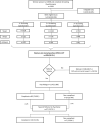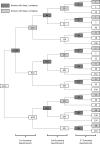Perinatal depression and mental health uptake referral rate in an obstetric service
- PMID: 37419918
- PMCID: PMC10328992
- DOI: 10.1038/s41598-023-33832-6
Perinatal depression and mental health uptake referral rate in an obstetric service
Abstract
Perinatal depression is an important indicator of mothers' mental health. Studies have been carried out to identify and characterize women at risk of such affective disorder. The aim of this study is to assess mothers' adherence to our perinatal depression screening and eventual follow-up by a multidisciplinary team, including mental health and obstetrics professionals. Ultimately, a risk profile for the uptake rate of referral was described to psychological support. Pregnant women from a maternity of a tertiary center with on-site assessment and treatment (n = 2163) were included in this study. The identification of women at risk for depression was based on a two-question screening and the EPDS scale. Demographic and obstetric data were obtained from medical records. The number of screening evaluations, the uptake referral rate and the compliance to treatment were analyzed. Logistic regression was used to predict a risk profile for adherence. Among 2163 enrolled in the protocol, 10.2% screened positive for depression. Of these, 51.8% accepted referral for mental health assistance. 74.9% were compliant to Psychology appointments and 74.1% to Psychiatry appointments. Women who had a previous history of depression were more likely to accept referral for mental health support. With this study, we were able to understand the behaviour of this population towards the screening protocol we offer. Women with a previous history of depression are more likely to accept mental health assistance.
© 2023. The Author(s).
Conflict of interest statement
The authors declare no competing interests.
Figures
Similar articles
-
Implementation of universal screening for depression during pregnancy: feasibility and impact on obstetric care.Am J Obstet Gynecol. 2016 Oct;215(4):517.e1-8. doi: 10.1016/j.ajog.2016.05.024. Epub 2016 May 20. Am J Obstet Gynecol. 2016. PMID: 27210067
-
Impact of Transfer of Maternal Care for Fetal Anomalies on Maternal Depression and Anxiety Screening: A Prospective Cohort at a Tertiary Care Center.Fetal Diagn Ther. 2023;50(4):282-288. doi: 10.1159/000531180. Epub 2023 Jun 5. Fetal Diagn Ther. 2023. PMID: 37276841
-
Patterns of use of a maternal mental health service in a low-resource antenatal setting in South Africa.Health Soc Care Community. 2015 Sep;23(5):502-12. doi: 10.1111/hsc.12167. Epub 2014 Oct 20. Health Soc Care Community. 2015. PMID: 25328059
-
Uptake of referrals for women with positive perinatal depression screening results and the effectiveness of interventions to increase uptake: a systematic review and meta-analysis.Epidemiol Psychiatr Sci. 2020 Jul 17;29:e143. doi: 10.1017/S2045796020000554. Epidemiol Psychiatr Sci. 2020. PMID: 32677601 Free PMC article.
-
Perinatal depression care pathway for obstetric settings.Int Rev Psychiatry. 2019 May;31(3):210-228. doi: 10.1080/09540261.2018.1534725. Epub 2019 Jan 31. Int Rev Psychiatry. 2019. PMID: 30701995 Review.
Cited by
-
Assessment of the factor structure of the EPDS in Chinese perinatal women: a longitudinal study using multigroup confirmatory factor analysis.Front Psychol. 2025 Mar 19;16:1526716. doi: 10.3389/fpsyg.2025.1526716. eCollection 2025. Front Psychol. 2025. PMID: 40177042 Free PMC article.
-
Increases in benzodiazepine prescribing for postpartum anxiety during COVID-19.Arch Womens Ment Health. 2025 Feb;28(1):181-190. doi: 10.1007/s00737-024-01488-4. Epub 2024 Jun 28. Arch Womens Ment Health. 2025. PMID: 38940966



